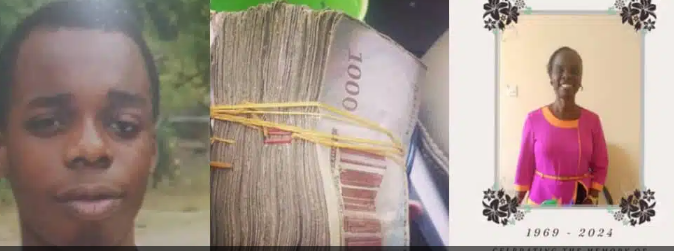
From Grief to Greed: Nigerian Man Accused of Faking Mother’s Death to Scam Schoolmates of Millions

A shocking scandal has erupted across Nigerian social media as a man identified as Adesanya Oluwatumilara is accused of faking the death of his own mother in a deceptive scheme to fraudulently collect millions of naira from unsuspecting schoolmates. What started as an apparent cry for sympathy has now turned into a nationwide outrage, with many calling for justice and some even speculating about deeper psychological issues that could explain the young man's brazen actions.
The story, which exploded on X (formerly known as Twitter), began circulating after a post exposed Oluwatumilara’s alleged actions. In what is being described as one of the most heartless cons seen in recent times, he reportedly circulated a fake obituary of his mother to elicit sympathy and financial support from classmates and friends. The scheme allegedly succeeded, pulling in significant contributions from individuals who genuinely believed he was grieving.
However, just as quickly as the donations poured in, so did the shock when a video surfaced showing Oluwatumilara not in mourning, but partying in a nightclub, dressed in expensive clothes, spraying wads of cash, and dancing gleefully. The contrast between the somber tone of his alleged loss and the carefree atmosphere of the video was too glaring to ignore. As the video gained traction, it sparked fury, confusion, and disbelief among those who had donated—and among many more who had seen the story unfold.
A now-viral post by an X user with the handle @badru_lanrez directly called out the alleged scammer, labeling him “a bastard and bloody thief” and accusing him not only of faking his mother’s death but also of previously using counterfeit scholarship letters to deceive others. The user warned the public never to trust a word from Oluwatumilara, calling him a “bloody liar.” The accusations have since spiraled, with thousands engaging with the post, and others coming forward with similar stories of near-victimization or warnings they had ignored.
Reactions in the comment section of the post have ranged from livid condemnation to dark humor and bitter resignation about the state of morality among some young Nigerians. One user, @ShigoBenson0, revealed that Oluwatumilara was part of a Manchester United fan group and that chaos had already broken out among its members. Others, like @A_RWAC, expressed outrage so intense they warned of violent repercussions if something similar were ever attempted with their own family. Another user sarcastically predicted a bleak future for Nigeria, quipping that given how the country often elevates the worst of its people, Oluwatumilara might as well become a senator or even president.
Some commenters shared similar past experiences, expressing little surprise at the incident. One said they had once been approached by a classmate with a similar sob story but had refused to give money. Others highlighted how certain facial expressions or mannerisms often betrayed habitual scammers and questioned how so many still fell for such tactics. One particularly dark comment even suggested that if not monitored, such a person might eventually consider real harm to his family in pursuit of money through even darker means.
The outrage has not remained confined to social media. Calls are now being made for legal action against Oluwatumilara, though no formal charges have been reported as of the time of writing. Legal analysts have pointed out that his actions, if verified, could be classified under fraud and cybercrime, especially given the use of digital platforms to perpetuate the deception. If prosecuted, he could face serious consequences under Nigerian law.
This incident sheds light not just on one man's moral failing, but on a broader societal issue. With the rising cost of living, unemployment, and desperation plaguing many Nigerians, some individuals are apparently resorting to extremes for financial gain. While such actions are universally condemned, they also raise important questions about how institutions, schools, and even peer groups can better educate and protect people from falling victim to scams—especially emotional ones that exploit empathy.
The emotional manipulation involved in faking the death of a loved one is particularly egregious. Death is a sacred subject in most cultures, and mourning often brings out the best of human kindness. To weaponize that vulnerability for personal enrichment is a move many see as both unforgivable and dangerous. Even worse, this kind of deceit undermines future cases where someone may genuinely be in need, as people become more suspicious and less likely to help out of fear of being scammed.
As the story continues to unfold, many await either a statement from Oluwatumilara or confirmation from those who know him personally, including his family. Some are even demanding proof of life from the allegedly deceased mother to fully clear the air. Until then, the man at the center of the controversy remains the subject of online scorn, memes, and moral debate.
While Nigerians have always been known for their resilience and sense of community, incidents like this test the limits of that unity. As some online users have noted, the story is not just about one individual but a reflection of deeper issues that plague a generation grappling with economic hardship, moral erosion, and a digital world that makes both scamming and exposing scammers alarmingly easy.
For now, the name Adesanya Oluwatumilara will be remembered as a cautionary tale of what happens when grief is fabricated, trust is betrayed, and the internet becomes both the stage and the court of public opinion.


